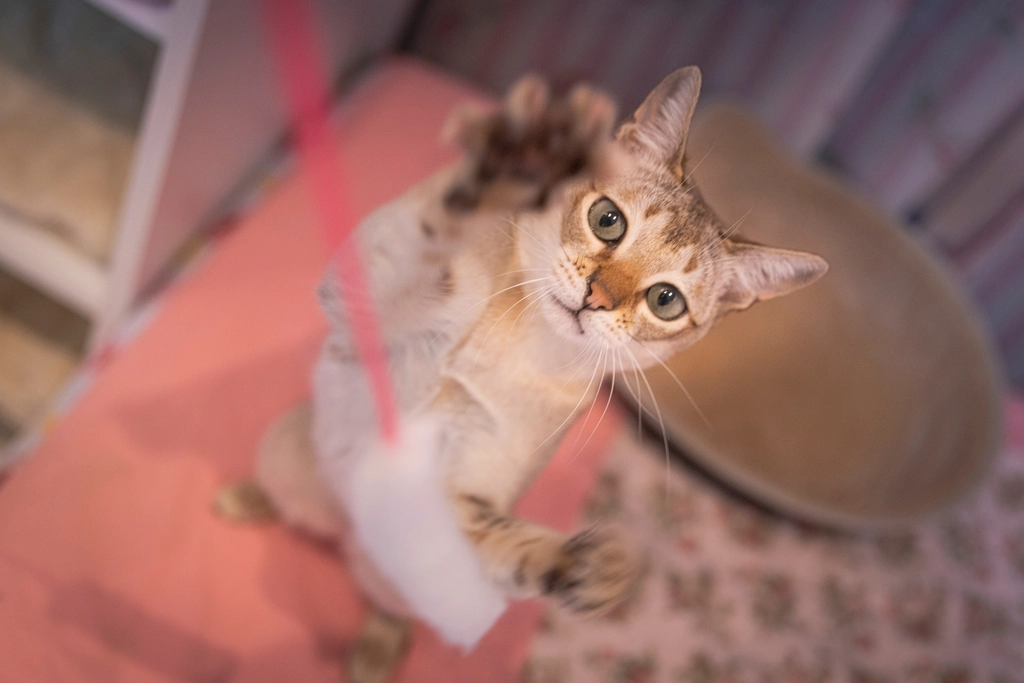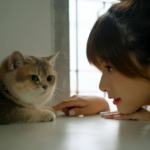Have you ever watched your cat stare longingly out the window or chase shadows across the wall? Maybe you’ve shrugged it off, figuring cats are independent creatures who don’t need much attention. But what if you never played with your cat—ever? The consequences might surprise you. From emotional distress to unexpected health problems, the simple act of skipping playtime can transform your playful furball into a frustrated, unhappy pet. Let’s unravel the hidden side effects and emotional impact of neglecting play, and why your kitty’s happiness might just depend on a game of string.
Loss of Emotional Bonding

Play is the glue that binds a cat and their human. Without those silly games of chase or gentle wrestling matches, the emotional connection between you and your feline can start to fade. Cats crave attention, even if they act aloof. Skipping out on playtime can make your cat feel ignored or forgotten, eroding the trust and warmth you’ve built together. Over time, you might notice your cat avoiding you, hiding more often, or even acting standoffish. The lack of shared fun means you both miss out on those heartwarming moments that make cat ownership so special. Just like friendships need laughter and shared experiences, so does your relationship with your cat. Without play, you risk becoming little more than the person who fills the food bowl.
Increased Risk of Obesity

Imagine sitting on the couch all day, every day, with nothing to do but eat and nap. That’s your cat’s reality without play. Cats are natural hunters, born to pounce and stalk. When there’s no outlet for this energy, the calories from their food don’t get burned off. It’s shockingly common for indoor cats to gain weight when play is taken away. Obesity in cats isn’t just about being chunky—it leads to serious health issues like diabetes, arthritis, and heart problems. Watching your once-agile cat struggle to groom themselves or climb the sofa is heartbreaking. Play is their gym session, and without it, their bodies pay the price.
Boredom and Frustration

Cats may seem chill, but their minds are always ticking. Take away play, and you leave them with a mountain of boredom. A bored cat is a frustrated cat. You might notice them staring blankly at the wall or pacing the hallway, desperate for something—anything—to do. This restlessness can turn into anxiety or even depression. Picture a toddler stuck in a room with no toys: the frustration builds until it bursts out in unexpected ways. Cats need stimulation to stay happy and balanced. Without play, their world shrinks, and their curiosity fades.
Destructive Behaviors Emerge

When cats don’t get enough play, they often find their own entertainment—much to your dismay. Scratched-up furniture, shredded curtains, and mysterious stains on your favorite rug suddenly become part of your daily life. These acts aren’t just random; they’re your cat’s way of coping with pent-up energy and boredom. If you’ve ever come home to a toppled plant or a knocked-over vase, you’ve seen the aftermath of a cat desperate for stimulation. Regular play gives your cat a safe, appropriate outlet for their wild instincts, saving your home from feline chaos.
Increased Stress and Anxiety

Cats are sensitive creatures, easily thrown off by changes or lack of engagement. Without play, stress can sneak up on them. You might see subtle signs—over-grooming, hiding, or even changes in appetite. Play helps cats release nervous energy and gives them a sense of control and accomplishment. When play disappears, anxiety can take its place, making your cat jittery or fearful. Even the calmest kitty can become overwhelmed when life lacks excitement. Play is like therapy for cats, smoothing out the rough edges of their day-to-day anxieties.
Declining Physical Health

It’s easy to forget that play is exercise for cats. Without it, their muscles weaken, their joints stiffen, and their reflexes dull. Older cats, in particular, suffer if play is neglected, as regular movement helps ward off arthritis and keeps them limber. Even young cats can become lethargic, spending most of their days snoozing instead of exploring. The decline might be slow, but over months or years, the lack of play takes a toll. Regular activity is vital for a healthy heart, strong muscles, and overall vitality. Without play, your cat’s body just isn’t at its best.
Loss of Hunting Instincts

At their core, cats are hunters. Play is their way of practicing these ancient instincts—stalking, pouncing, and capturing their “prey,” whether that’s a toy mouse or a ball of yarn. When you never play with your cat, these instincts start to dull. It’s a bit like a musician who never practices; those natural abilities fade. This can lead to a less confident, less engaged cat, one who’s more likely to shy away from new experiences. Keeping those hunting skills sharp is about more than fun—it’s about preserving your cat’s sense of self.
Development of Depression

Yes, cats can get depressed. Without play, life becomes a gray blur for them. You might notice your cat sleeping far more than usual, losing interest in food, or hiding for hours on end. These are red flags that your cat’s mental health is suffering. Playtime injects joy and variety into their daily routine. Without it, the spark goes out. Depression in cats isn’t just sad—it can lead to physical health problems, too, compounding the damage. A happy cat is a playful cat, and denying them this joy is like closing the curtains on a sunny day.
Weakened Social Skills

Cats aren’t born knowing how to interact with humans or other pets—they learn through play. If you never engage with your cat, they miss out on these critical social lessons. Kittens especially need play to develop proper manners and bite inhibition. An adult cat who never learned these skills might be more likely to scratch or bite, or simply avoid interaction altogether. Play teaches boundaries, trust, and communication. It’s the foundation of a well-adjusted, sociable cat. Skip play, and you risk raising a feline loner.
Reduced Mental Stimulation

A cat’s brain is like a puzzle box, always looking for something to figure out. Play challenges their minds, forcing them to think, plan, and react. Take away this mental workout, and their cognitive abilities can dull over time. Older cats, in particular, benefit from the mental challenge of play, which helps keep their minds sharp and alert. Without it, confusion and forgetfulness can set in, much like in humans who stop learning new things. Play is a brain boost your cat can’t live without.
Territorial and Aggressive Behaviors

Cats who don’t have an outlet for their energy may become territorial or even aggressive. You might notice them hissing at other pets, swatting at your hands, or guarding their favorite spots. These behaviors are often a cry for attention or a sign of pent-up frustration. Play helps channel this energy in a positive direction, teaching your cat how to interact without aggression. Without it, their world feels smaller and more threatening, leading to defensive or hostile behavior.
Strained Relationships With Other Pets

In multi-pet households, play is a vital way for cats to bond and establish a social hierarchy. Without it, misunderstandings and conflicts are more likely to arise. Cats may become jealous, withdrawn, or even aggressive toward their furry housemates. Regular play sessions can diffuse tension and help everyone get along. Neglecting play can turn your home into a battleground, with pets competing for your attention or acting out their frustration on each other.
Missed Opportunities for Training

Playtime isn’t just fun—it’s a golden opportunity for teaching. Through play, you can teach your cat to come when called, drop a toy, or even perform tricks. These moments of learning strengthen your bond and make life together smoother. Without play, these teaching moments disappear. Your cat misses out on valuable lessons, and you miss out on those proud “aha!” moments when they finally master a new skill. Play makes learning feel like a game, not a chore.
Declining Grooming Habits

Believe it or not, active cats tend to groom themselves more often. Play keeps them alert and invested in their own well-being. When cats become sluggish and bored, their grooming habits can slip. You may notice their coat losing its shine, or even patches of matted fur. Poor grooming can lead to skin problems and discomfort, making your cat feel even worse. Regular play keeps them engaged and more likely to keep up with their hygiene.
Shortened Lifespan

It’s a sobering thought, but cats who live sedentary, unstimulated lives are at risk for a shorter lifespan. The health problems associated with inactivity—obesity, diabetes, depression—can pile up over the years. Play is more than a pastime; it’s an investment in your cat’s future. Those daily bursts of energy keep their bodies strong and their spirits high, helping them live longer, healthier lives. Skipping play is like skipping out on years you could have enjoyed together.
Loss of Joy and Spark

At the end of the day, the saddest consequence of never playing with your cat is the loss of pure, unfiltered joy. Cats light up when they play—their eyes widen, their tails twitch, and their bodies spring to life. Without play, that spark fades. Life becomes routine, predictable, and dull. It’s not just about preventing problems; it’s about giving your cat a reason to leap, run, and dream. Play is where the magic happens, where memories are made and laughter fills the room.

Linnea is a born and bred Swede but spends as much time as possible in Cape Town, South Africa. This is mainly due to Cape Town’s extraordinary scenery, wildlife, and atmosphere (in other words, because Cape Town is heaven on earth.) That being said, Sweden’s majestic forests forever hold a special place in her heart. Linnea spends as much time as she can close to the ocean collecting sea shells or in the park admiring puppies.





